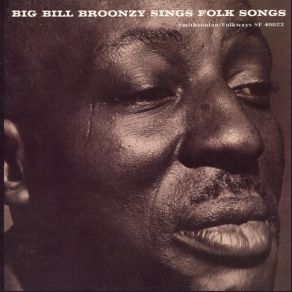Big Bill Broonzy Sings Folk Songs
Download links and information about Big Bill Broonzy Sings Folk Songs by Big Bill Broonzy. This album was released in 1956 and it belongs to Blues, Country, Songwriter/Lyricist, Acoustic genres. It contains 11 tracks with total duration of 34:36 minutes.

|
|
|---|---|
| Artist: | Big Bill Broonzy |
| Release date: | 1956 |
| Genre: | Blues, Country, Songwriter/Lyricist, Acoustic |
| Tracks: | 11 |
| Duration: | 34:36 |
| Buy it NOW at: | |
| Buy on iTunes $9.99 | |
| Buy on Amazon $8.99 | |
Tracks
[Edit]| No. | Title | Length |
|---|---|---|
| 1. | Backwater Blues | 2:52 |
| 2. | This Train | 3:00 |
| 3. | I Don't Want No Woman - To Try to Be My Boss | 3:08 |
| 4. | Martha | 5:00 |
| 5. | Tell Me Who | 3:41 |
| 6. | Bill Bailey | 1:57 |
| 7. | Alberta | 2:13 |
| 8. | Goin' Down This Road | 2:22 |
| 9. | Tell Me What Kind of Man Jesus Is | 2:16 |
| 10. | John Henry | 4:44 |
| 11. | Glory of Love | 3:23 |
Details
[Edit]Often ranked with such blues greats as Robert Johnson, Son House, and Elmore James, Big Bill Broonzy was for many years the last surviving practitioner of the "Delta" style of blues. This record, cut for Smithsonian Folkways in 1956, captures Broonzy late in his career but still during the peak of his power. Indeed, a more magisterial performance could not be imagined. While born and raised on the Mississippi, Broonzy takes this opportunity to demonstrate the range of musical influences he's successfully mastered over the course of his career. Proving to be equally at home in both country-folk and straight blues idioms, Broonzy offers sparkling renditions of both "Alberta" and "John Henry," where Broonzy sings an interesting set of uncommon lyrics, bending the melody with an inspired blues shift. On "This Train," Broonzy works the call and response with a gospel choir and scathingly delivers the line, "This train carries both white and black now." Perhaps simply to prove a point, he closes with the slightly more contemporary standard "Glory of Love," sweetly inflecting the chorus with a tender bit of jazz lyricism. While this is not considered "the" Broonzy album to own, it is, nonetheless, a very good one, and has the obvious advantage of being kept continuously in print by Smithsonian Folkways.